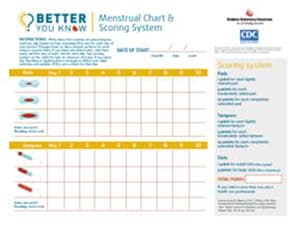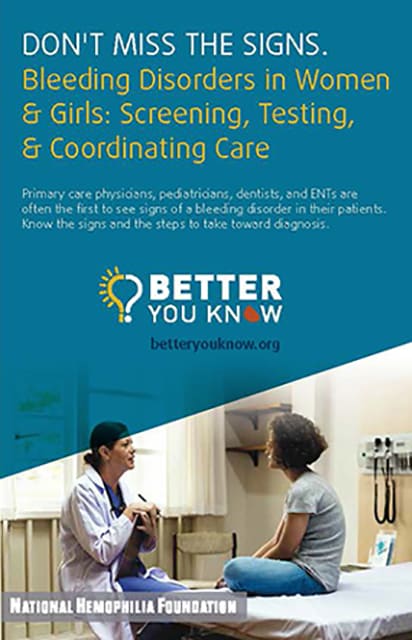Better You Know
As many as 1% of women in the United States may have a bleeding disorder, and many may not know it. Don’t miss the signs. The Better You Know campaign was created to help you find out if you might be at risk for a bleeding disorder.

The Better You Know campaign, developed by the National Hemophilia Foundation in partnership with the Centers for Disease Control and Prevention (CDC), raises awareness of bleeding disorders among women and girls who may experience symptoms but have not yet been diagnosed.
Bleeding disorders, such as hemophilia and von Willebrand disease (VWD), are conditions in which certain proteins in the blood are missing or do not work properly, making it hard for the blood to clot. Bleeding disorders can pose unique health challenges for women because of the impact these conditions can have on their reproductive health and quality of life. Symptoms can include heavy menstrual bleeding (HMB), frequent nosebleeds, easy bruising, and heavy, hard-to-stop bleeding during or after surgery, dental procedures, and childbirth. The campaign has a suite of FREE tools and resources in English and Spanish to help increase knowledge and awareness of bleeding disorders in women and girls and provides information for healthcare providers.
Bleeding disorders in women can be treated. Explore the campaign and its resources to learn if you might be at risk for a bleeding disorder. Finding out if you are at risk can be the first step to feeling better!
Resources on the Signs and Symptoms

HMB, or heavy periods, may be the most noticeable symptom of a bleeding disorder in women and girls.
Signs of HMB include
- Bleeding that lasts longer than 7 days from the time it begins until it ends;
- Flooding or gushing of blood that limits daily activities;
- Passing clots that are bigger than a grape; and
- Soaking a tampon or pad every hour, or more often, on the heaviest day(s).
Download this menstrual chart to help you keep track of your period. Download the Spanish version.
In the United States, about 1.6 million (or about 1 in every 100) women have a bleeding disorder, and many don’t know they have it. To help women and girls know if they might be experiencing the signs and symptoms of a bleeding disorder, the campaign includes
- A free, online risk assessment tool;
- A brochure for teenage girls about normal and abnormal menstrual cycles;
- A downloadable menstrual chart to help keep track of bleeding during a period; and
- Free postcards to help increase awareness about bleeding disorders in women.
Access these free materials here.
Resources When Seeking Care
If you think you have symptoms of a bleeding disorder, it’s important to talk to your doctor. Use the following resources to help prepare for your visit with your healthcare provider:
- A healthcare diary to help you discuss your health history and current bleeding signs and symptoms;
- A preparation tool to help you think of questions that may be helpful to ask when talking to your healthcare provider;
- A booklet providing information on lab tests, screening tools, and health exams to diagnose a bleeding disorder; and
- A lab test log to help keep track of different laboratory tests ordered by your healthcare provider.
Access these free materials here.
Resources for Healthcare Providers
Don’t Miss the Signs

Obstetricians/gynecologists and general healthcare providers may be the first to recognize signs of a bleeding disorder in women and girls. The campaign provides brochures on methods used to assess bleeding symptoms, determine risk for a bleeding disorder and, for patients at risk, how to coordinate care with a hematologist for diagnostic testing. In addition, the campaign includes webinar trainings that providers can take online for free to increase their knowledge about bleeding disorders in women.
More Information
Learn more about bleeding disorders and the signs and symptoms at CDC’s Bleeding Disorders in Women webpage.
Visit the Better You Know campaign website.
Learn more about the National Hemophilia Foundation.
